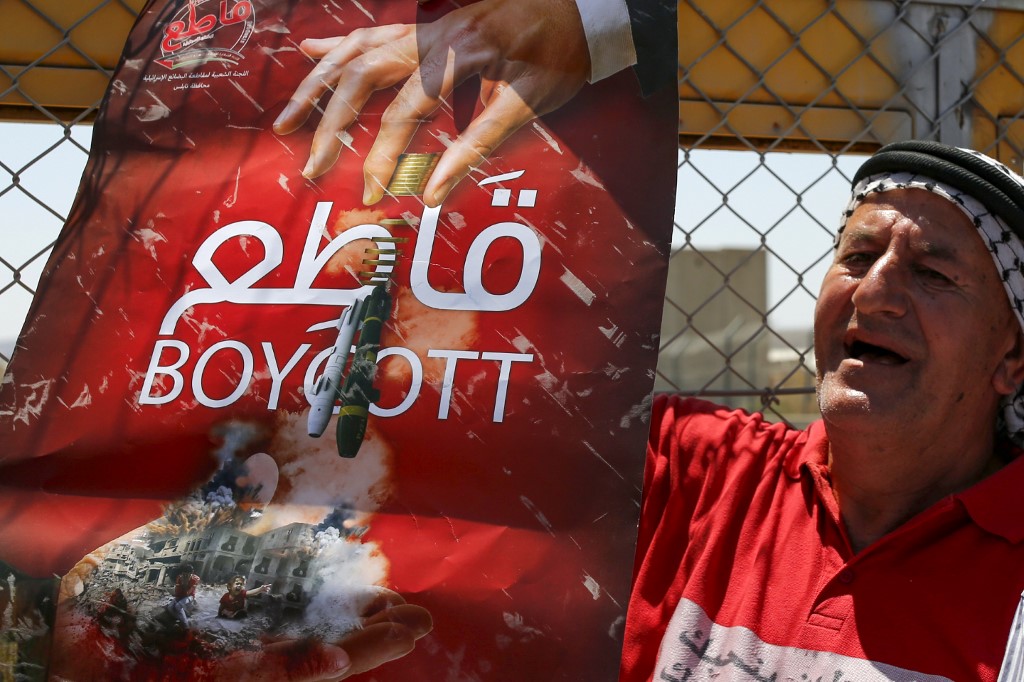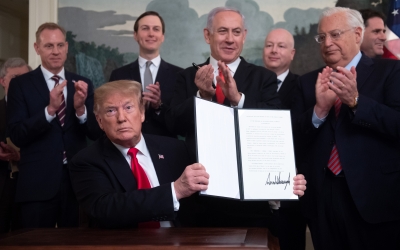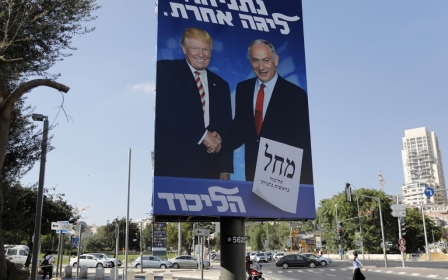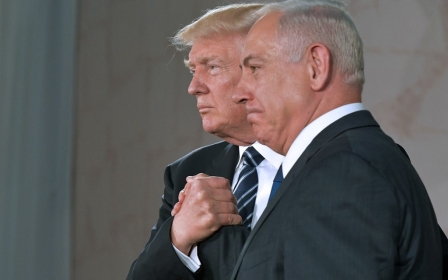Trump wants to silence criticism of Israel. We must keep resisting
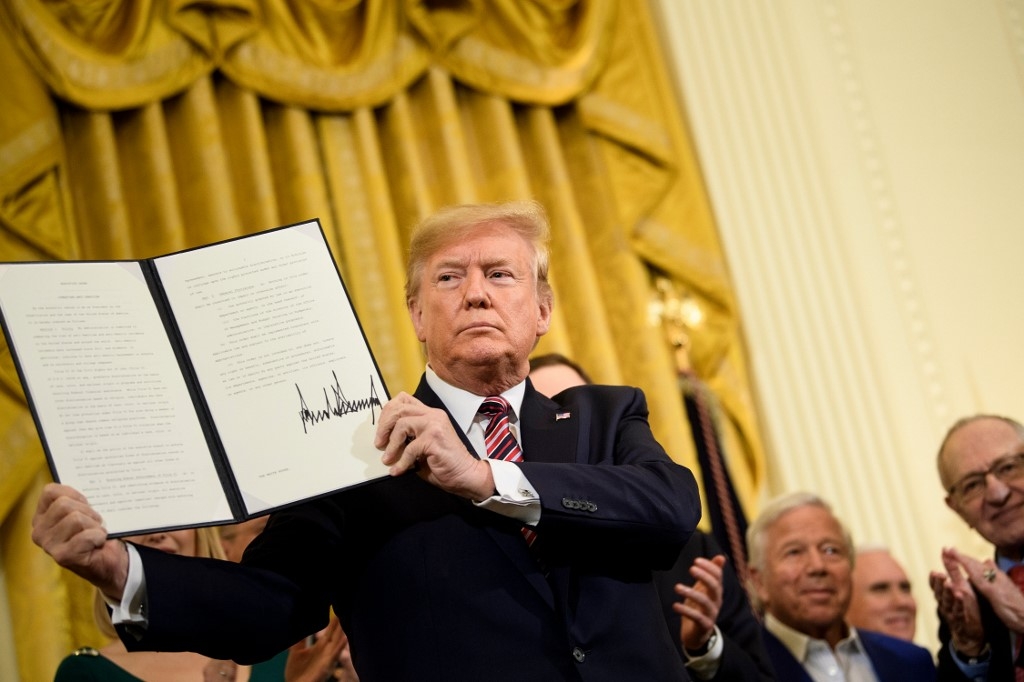
On 11 December, US President Donald Trump signed an executive order - allegedly to protect Jewish students from antisemitism on campuses - that constitutes a critical escalation of his anti-Palestine rhetoric.
Yet, the order is a logical development, rather than a departure from his previous actions. As activists, organisers and our allies will undoubtedly be focusing on the best ways to address this latest outrage, it is important to keep a few concerns in mind.
Quelling BDS
Firstly, Trump’s order is only the latest in a long campaign by Israel advocates and politicians, both Democratic and Republican, to silence criticism of Israel - and specifically, to quell the boycott, divestment and sanctions (BDS) movement on college campuses.
Mondoweiss described it as a declaration of war on the Palestine solidarity movement, but that war has been ongoing for decades, and was certainly not “launched” by Trump.
New MEE newsletter: Jerusalem Dispatch
Sign up to get the latest insights and analysis on Israel-Palestine, alongside Turkey Unpacked and other MEE newsletters
A decade ago, University of California professors Saree Makdisi and David Theo Goldberg documented 33 organisations monitoring speech critical of Israel on US campuses - a number that has since grown, and whose mission has evolved beyond mere “monitoring” to active legislation against students and faculty who support Palestine justice.
Solidarity with Palestine is growing, despite the heavy-handed censorship and muzzling
Solidarity with the oppressed Palestinian people has always come under attack in the US, but as BDS offered concrete steps to enact that solidarity, transforming the global discourse on Zionism and indigenous Palestinian resistance, it became the target of focused attacks at the highest governmental levels, in both Israel and the West. The US, Canada, UK, France and Germany have all come down heavy-handedly on the grassroots movement.
So, while many Jews were justifiably concerned about Trump’s claim that their religion is a nationality - a claim that circulated widely before the order was signed, and which would make them “outsiders” to all countries they live in, except for Israel - those Jews who are not Zionists cannot, and should not, make this about themselves.
Solidarity with Palestine is growing, despite the censorship and muzzling. Trump’s threatened order, inspired by Zionist advisers, is ultimately about silencing Palestinians and criticism of Israel.
Intrinsic racist inequality
Israel has always maintained a distinction between “nationality” and “citizenship”, whereby all Jews, Israeli or not, can obtain “nationality”, while non-Jews, meaning Israel’s Palestinian population, are only ever granted citizenship.
Any support for Israel is a support of this intrinsic racist inequality, upon which Israel was founded as a “Jewish nation”. Trump’s executive order creates another opportunity to explain to “liberal Zionists” that all Zionism is racism, because Zionism is the belief that Jews should be an exclusivist, undemocratic nation.
Trump’s order is also the logical follow-up to all of the anti-BDS legislation that activists have been fighting for the past few years, as politicians, including supposedly “progressive” ones, fail to defend BDS, with few exceptions.
None of the measures to criminalise BDS have tamped the rise of antisemitism in this country, as evidenced by the worrisome number of attacks on Jewish stores, community centres, synagogues and cemeteries. And these attacks are perpetrated by white supremacists, not BDS activists.
We should convey this message to those politicians who are genuinely concerned about antisemitism, and who have mistakenly - or conveniently, or simply out of intellectual and moral laziness - blamed BDS for it.
Trump’s order could withhold funding from universities that do not shut down criticism of Israel. But pro-Palestine justice activism has never relied on major funding from state grants and university administrators for its work, which continues to flourish at the grassroots level.
Unlike the Zionist trolls who are paid to spread pro-Israel discourse, BDS activists are volunteers, donating their time, energy and creativity, and paying out of pocket to give talks, create flyers and produce banners.
While Trump’s executive order may impact speech on campus, possibly putting an end to events such as Israeli Apartheid Week - which may now have to move to the basements and meeting rooms of churches, mosques and hopefully a few synagogues - truly radical activists have long known that “the revolution will not be funded”.
Legality and morality
As a former member of the steering collective of Incite!, a network of feminists of colour organising to end violence, I recall that in early 2004 - even before the call for BDS was issued - we had secured a generous grant from the Ford Foundation for our work.
We started two major projects unrelated to Palestine solidarity, only to be told months later that the grant had been withdrawn after Ford Foundation board members read online our “points of unity”, which included solidarity with the Palestinian struggle. After the initial shock, Incite! went ahead with the projects regardless, raising money a dollar at a time, without foundation grants.
We must not fool ourselves with the idea that truly revolutionary work is necessarily “legal”, nor that legality is necessarily moral. The most important response at this moment is to renew our commitment to justice, knowing that justice has at many times throughout history been at odds with “power”.
Slavery was legal, and so was apartheid, as well as the Holocaust. What is legal is not necessarily moral, and what is “illegal” may be the most moral behaviour.
Let 2020 be the year that we all recommit to a vision of justice for all - in the US, where white supremacy is expressing itself in nativism, Islamophobia and antisemitism, but also in Palestine, where Zionism, which has always maintained that Jews are a “nation” and not just a religion, must also be challenged, as we work to establish justice from the river to the sea.
A new campaign launched this month by the US Campaign for Palestinian Rights and the Adalah Justice Project asserts a commitment to “the right to resist”.
At the same time, Palestine Legal’s director, Dima Khalidi, has asserted that “rather than providing any new protections to Jewish students against the rampant and deadly antisemitism of a resurgent white nationalism, [Trump’s order] aims to define the contours of what we can say about Palestine and Israel. We won’t abide, and it will be challenged.”
The views expressed in this article belong to the author and do not necessarily reflect the editorial policy of Middle East Eye.
Middle East Eye delivers independent and unrivalled coverage and analysis of the Middle East, North Africa and beyond. To learn more about republishing this content and the associated fees, please fill out this form. More about MEE can be found here.



